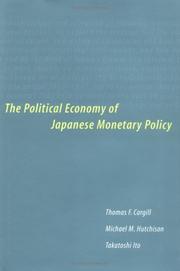| Listing 1 - 3 of 3 |
Sort by
|

ISBN: 0262083477 9780262083478 9786612098215 0262275988 1282098217 1423790251 0262292114 9780262275989 9781423790259 9781282098213 Year: 2006 Publisher: Cambridge, Mass. MIT Press
Abstract | Keywords | Export | Availability | Bookmark
 Loading...
Loading...Choose an application
- Reference Manager
- EndNote
- RefWorks (Direct export to RefWorks)
Experts on the Japanese economy examine Japan's prolonged period of economic underperformance, analyzing the ways in which the financial system, monetary policy, and international financial factors contributed to its onset and duration.
Economic order --- Japan --- Recessions --- -Monetary policy --- -Finance --- -339.50952 --- Funding --- Funds --- Economics --- Currency question --- Monetary management --- Economic policy --- Currency boards --- Money supply --- Business cycles --- Depressions --- -Economic conditions --- -Recessions --- Monetary policy --- Finance --- Economic conditions --- Electronic books. -- local. --- Finance -- Japan. --- Japan -- Economic conditions -- 20th century. --- Japan -- Economic policy -- 20th century. --- Monetary policy -- Japan. --- Recessions -- Japan. --- Economic Theory --- Business & Economics --- -Electronic books. -- local. --- -Economic order --- Nihon --- Nippon --- Iapōnia --- Zhāpān --- I︠A︡ponii︠a︡ --- Yapan --- Japon --- Japão --- Japam --- Mư̄ang Yīpun --- Prathēt Yīpun --- Yīpun --- Jih-pen --- Riben --- Government of Japan --- 日本 --- 日本国 --- Nipponkoku --- Nippon-koku --- Nihonkoku --- Nihon-koku --- State of Japan --- Япония --- Japani --- اليابان --- al-Yābān --- يابان --- Yābān --- Japonsko --- Giappone --- Japonia --- Japonya --- ECONOMICS/Political Economy --- ECONOMICS/International Economics --- Jepun --- Yapon --- Yapon Ulus --- I︠A︡pon --- Япон --- I︠A︡pon Uls --- Япон Улс

ISBN: 0262032473 026251527X 0262269880 0585023581 026226207X 9780585023588 9780262269889 9780262032476 Year: 1997 Publisher: Cambridge, Mass. MIT Press
Abstract | Keywords | Export | Availability | Bookmark
 Loading...
Loading...Choose an application
- Reference Manager
- EndNote
- RefWorks (Direct export to RefWorks)
The contributions in this book provide a unique view of its emergence and growth in a number of different national settings in an area of the Third World where the industry is most advanced. The motor vehicle industry has had a dramatic impact on industrialized societies, shaping the structure and productive processes of capitalist economies and defining consumer life styles. The industry's impact on the Third World has been no less significant. The contributions in this book provide a unique view of its emergence and growth in a number of different national settings in an area of the Third World where the industry is most advanced. They explore what occurs when the world's leading consumer durable is produced and sold in a context of dependency and underdevelopment. Chapters by Kenneth S. Mericle, Rhys Jenkins, and Rich Kronish examine the political economy of the motor vehicle industry as it has evolved in Brazil, Argentina, and Mexico, stressing the importance of the structural problems it has encountered. Chapters by John Humphrey, Judith Evans, Paul Heath Hoeffel and Daniel James, and by Ian Roxborough focus on the role and impact of labor in the same three countries. Chapters by Douglas Bennett and Kenneth Sharpe, and Michael Fleet (on the industry in Colombia) discuss the bargaining process between the transnational vehicle corporations and the Latin American governments. A concluding chapter by the editors summarizes the study and offers a history of the industry in the three principal countries from 1900 to 1980.
Monetary policy --- -Banks and banking, Central --- -332.4952 --- Banker's banks --- Banks, Central --- Central banking --- Central banks --- Banks and banking --- Monetary management --- Economic policy --- Currency boards --- Money supply --- Nihon Ginkō. --- Bank of Japan --- Japan. --- Nichigin --- Nippon Ginkō --- 日本銀行 --- Japan --- -Monetary policy --- Banks and banking, Central --- ECONOMICS/Trade & Development --- Nihon Ginko.

ISBN: 0262269872 1423730712 0262032856 9780262269872 9780262032858 9781423730712 Year: 2000 Publisher: Cambridge, Mass. MIT Press
Abstract | Keywords | Export | Availability | Bookmark
 Loading...
Loading...Choose an application
- Reference Manager
- EndNote
- RefWorks (Direct export to RefWorks)
Annotation Japan's financial institutions and policy underwent remarkable change in the past decade. The country began the 1990s with a heavily regulated financial system managed by an unchallenged Ministry of Finance and ended the decade with a Big Bang financial market reform, a complete restructuring of its regulatory financial institutions, and an independent central bank. These reforms have taken place amid recession and rising unemployment, collapsing asset prices, a looming banking crisis, and the lowest interest rates in the industrial world. This book analyzes how the bank-dominated financial system--a key element of the oft-heralded "Japanese economic model"--Broke down in the 1990s and spawned sweeping reforms. It documents the sources of the Japanese economic stagnation of the 1990s, the causes of the financial crisis, the slow and initially limited policy response to banking problems, and the reform program that followed. It also evaluates the new financial structure and reforms at the Bank of Japan in light of the challenges facing the Japanese economy. These challenges range from conducting monetary policy in a zero-interest rate environment characterized by a "liquidity trap" to managing consolidation in the Japanese banking sector against the backdrop of increasing international competition.
-Banks and banking, Central --- -332.110952 --- Finance --- Banks and banking, Central --- Banker's banks --- Banks, Central --- Central banking --- Central banks --- Banks and banking --- 332.110952 --- 333.111.0 --- 333.846.0 --- 336.61 --- JP / Japan - Japon --- Algemeenheden. Theoretische en beschrijvende studies. Centrale banken --- Verband tussen het monetair, bank- en kredietbeleid en de economische ontwikkeling: algemeenheden --- Financieel beleid --- ECONOMICS/Finance --- ECONOMICS/International Economics --- ECONOMICS/Macroeconomics
| Listing 1 - 3 of 3 |
Sort by
|

 Search
Search Feedback
Feedback About UniCat
About UniCat  Help
Help News
News